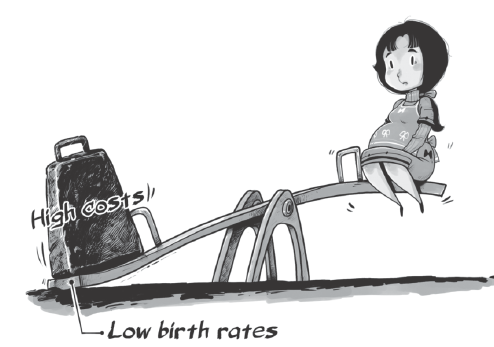 |
| CAI MENG/CHINA DAILY |
The family planning policy has been changed and, from Jan 1, all couples were allowed to have two children. Within months, however, some cities began facing challenges. Since many hospitals have limited beds in their obstetrics departments, pregnant women found it difficult to register for childbirth.
The new family planning policy took effect just about nine months ago, so it is difficult to get authentic data on the number of newborns in the country. But many people say the overcrowding in obstetrics departments of hospitals suggest the new family planning policy has sparked a baby boom.
But given the fact that not many eligible families opted to have a second child earlier when the government allowed couples either of whom was the only child of his/her family to have two children, the new family planning policy will not lead to a baby boom.
Although all couples can now have two children, many of them were born before the 1980s and have thus crossed the normal childbearing age. As to those young couples born in or after the 1980s, many of them are reluctant to have two children because of the high cost of raising a child. For instance, in a survey conducted in Liaoning province at the beginning of the year, only 13.7 percent of the respondents said they would have two children, with about 80 percent saying they had no such intention.
This means the fertility desire level is between 1.0 and 1.2; the actual fertility rate may be even lower. China stepped into the low birth-rate era in the 1990s, and people's low fertility desire means a baby boom is not likely in the near future.
Due to the high cost of raising a child, which includes expenditure on education, housing and other essentials, plus the consumption of time, China's actual fertility rate may not be higher than 1.5. The birth rate in big cities is even lower, because of the busy lifestyle of couples and the high cost of living.
However, it is a fact that obstetrics departments of hospitals, especially in big cities, are overburdened with patients. Some media reports have said that families have had to queue up to register for pregnancy check, but that doesn't necessarily mean the number of pregnant women has suddenly shot up.
Because of the limited number of beds, some hospitals have imposed a quota on daily consultation numbers to ensure every pregnant woman is allotted a bed for childbirth. Since this is a public medical service problem, medical authorities and hospitals should optimize the medical resources at their disposal to solve it. And to improve obstetrics care services and social policies for expectant mothers, the authorities should first strengthen the public service system. The number of hospital beds, obstetricians and pediatricians should all be increased to meet the demand of expectant mothers and newborns.
In addition, the authorities should simplify the registration procedure for having a second child and encourage couples to have two children. Unfortunately, China's population policy still focuses on population control. For instance, although the Beijing municipal authorities have reduced the fines collected from couples that have more than two children, they still impose a fine three to 10 times the amount of the standard social maintenance fee for the third and subsequent child, which may be as high as 520,000 yuan ($78,040), according to the draft for the revised social maintenance fee.
The regulation shows population authorities still believe in controlling the population, which will make it difficult to solve China's demographic problems in the long term.
The author is a professor at the Population Research Institute of Peking University.

Colombian coffee has a story that I admire and use in my lectures and the reasons are the ones listed above. Congratulations!
